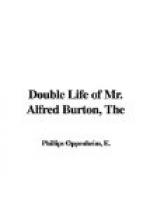Burton drew a long sigh of relief.
“Thank you,” he said. “How much shall you pay me for it?”
The sub-editor estimated the length of the production. It was not an easy matter, owing to the odd scraps of paper upon which it was written.
“Will ten guineas be satisfactory?” he inquired.
“Very satisfactory indeed,” Burton replied, “and I should like it now, at once, please. I need some money to send to my wife.”
The sub-editor rang for the cashier.
“So you are married,” he remarked. “You seem quite young.”
“I am married,” Burton admitted. “I am not living with my wife just now because we see things differently. I have also a little boy. They live down at Garden Green and I send them money every Saturday.”
“What do you do? What is your occupation?”
“I just wander about,” Burton explained. “I used to be an auctioneer’s clerk, but I lost my situation and I couldn’t get another.”
“What made you think of writing?” the sub-editor asked, leaning a little over towards his new contributor.
“I picked up a copy of your newspaper on a seat in the Park,” Burton replied. “I saw that article on ‘London Awake.’ I thought if that sort of thing was worth printing, it was worth paying for, so I tried to do something like it. It is so easy to write just what you see,” he concluded, apologetically.
The sub-editor handed him his ten guineas.
“When will you bring me some more work?”
“Whenever you like,” Burton replied promptly. “What about?”
The sub-editor shook his head.
“You had better choose your own subjects.”
“Covent Garden at half-past three?” Burton suggested, a little diffidently. “I can’t describe it properly. I can only just put down what I see going on there, but it might be interesting.”
“Covent Garden will do very well indeed,” the sub-editor told him. “You needn’t bother about the description. Just do as you say; put down—what you see.”
Burton put down just what he saw as he moved about the city, for ten days following, and without a word of criticism the sub-editor paid him ten guineas a time and encouraged him to come again. Burton, however, decided upon a few days’ rest. Not that the work was any trouble to him; on the contrary it was all too ridiculously easy. It seemed to him the most amazing thing that a description in plain words of what any one might stand and look at, should be called literature. And yet some times, in his more thoughtful moments, he dimly understood. He remembered that between him and the multitudes of his fellow-creatures there was a difference. Everything he saw, he saw through the clear white light. There were no mists to cloud his vision, there was no halo of idealism hovering around the objects upon which his eyes rested. It was the truth he saw, and nothing beyond it. He compared




